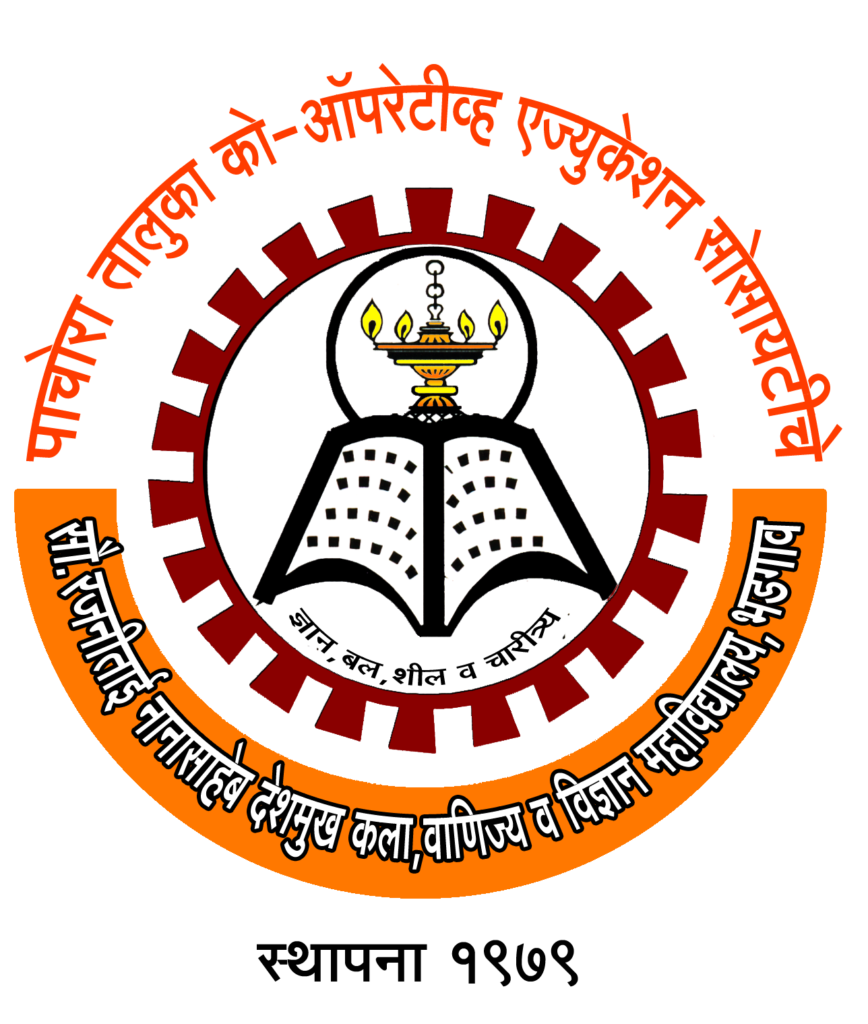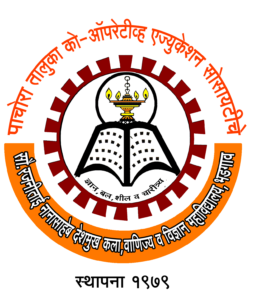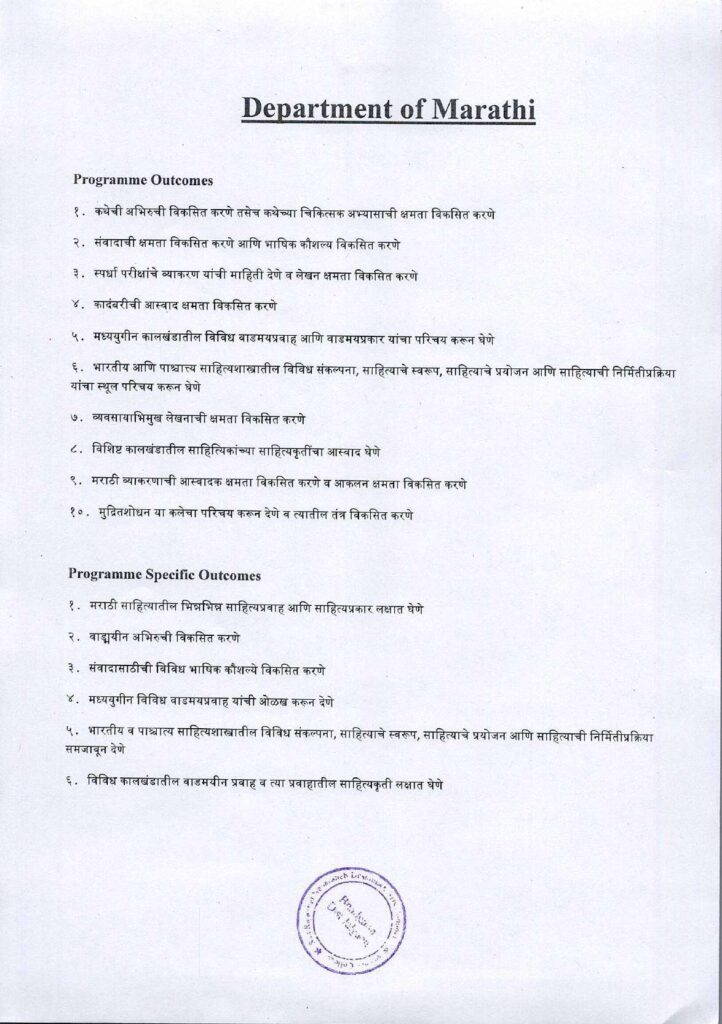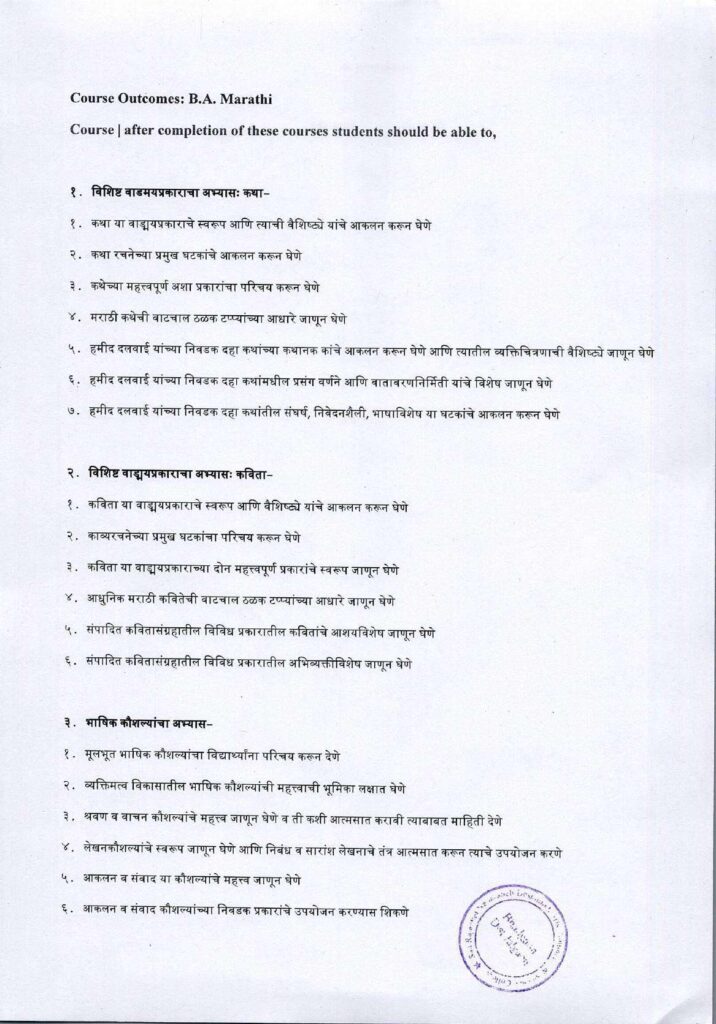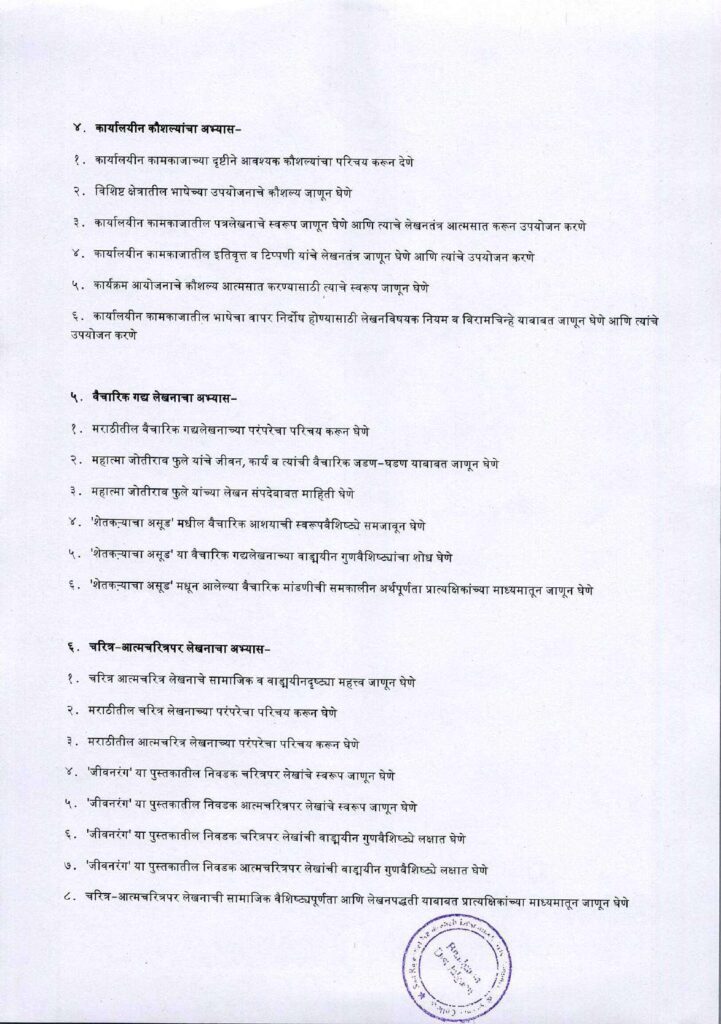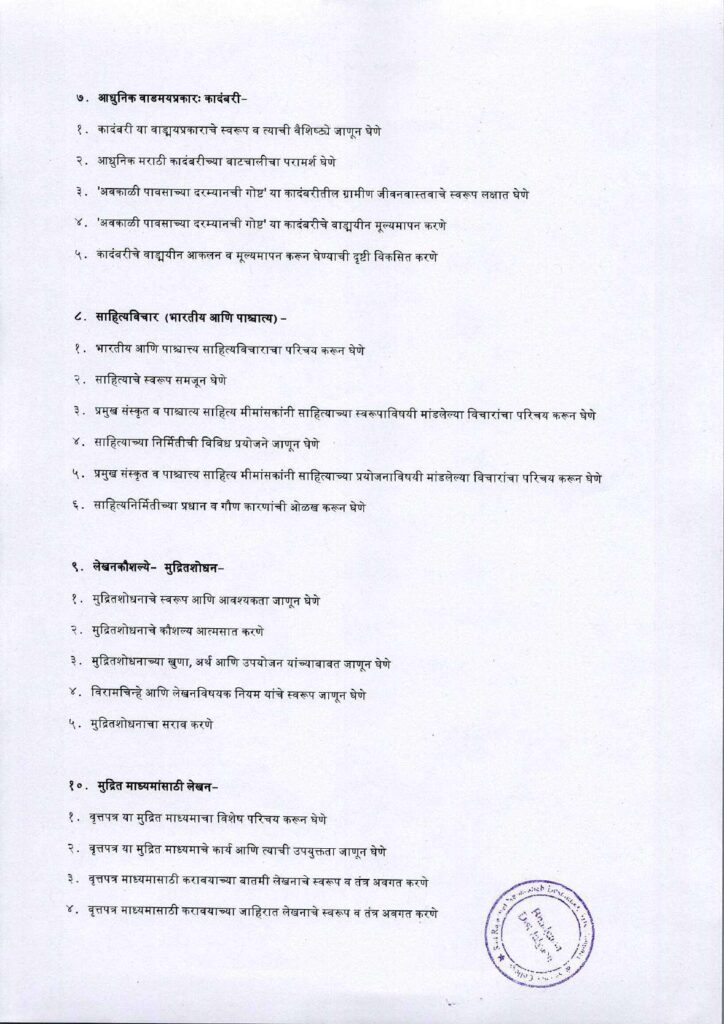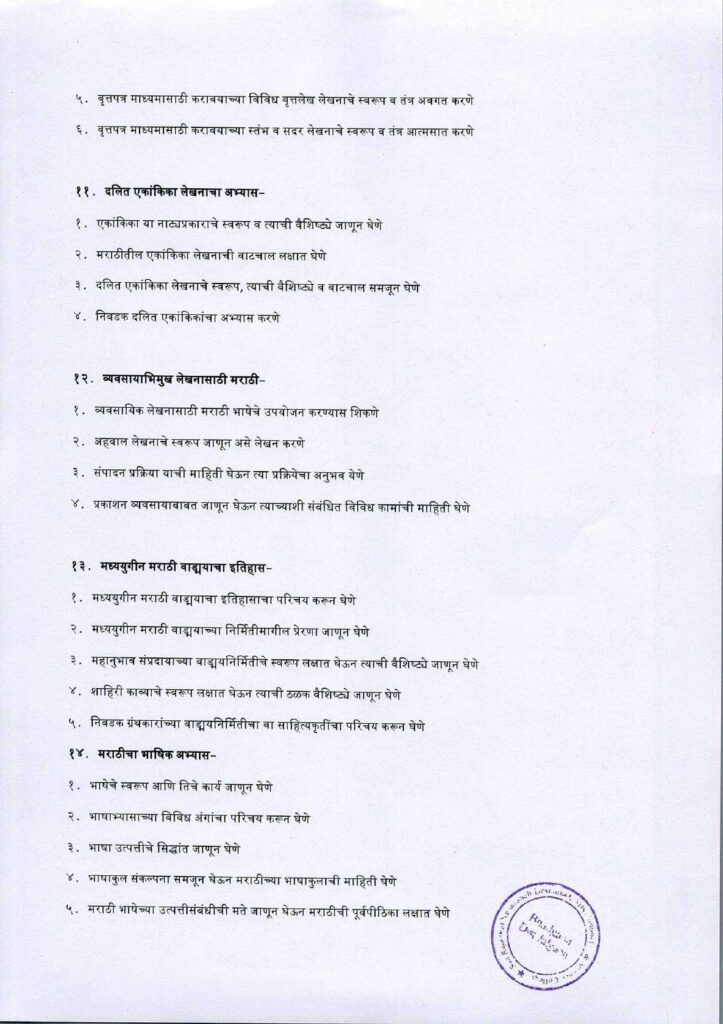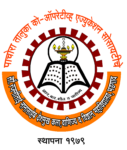CO, PO, PEO
program outcome and Course Outcome
Programme Outcomes: B.A.
After successful completion of three year degree program in Economics student should be able to; Programme Outcomes
1) Principles of Micro-economics Programs Specific Outcome
- Introduced the students to the basic principles of microeconomic
- How to microeconomic concepts can be applied to analyze real life situations
Course Specific Outcomes
Paper Title: Indian Economy since 1980 Part III
Outcome of paper: -After study of the courses the student
- To enable students to have understanding the various issue of the Indian Economy
- To develop the analyzing capability in the context of current Indian Economic problems
- To able the students for appearing the MPSC, UPSC and other competitive exam
2. Paper/Course code ‐ Eco 352(A) Special Paper 3 Paper Title – “Public Finance and policies”‐I Outcome of paper: –
- To enable students to have understanding the various issue of public finance and
- To develop the analyzing capacity in the context of Public Finance and
- To able the students for appearing the MPSC, UPSC and other competitive
3. Paper /Course No: ‐ Eco 353(A) Special Paper ‐4
Paper/ Course Title – “International Trade and Practices “‐I
Outcome of paper: –
- To make student familiar with the basic theories of International trade &
- To enable the student to understand objectives & working of the International
Programme Outcomes: B A Geography
After competing B.A. Programme in Geography, students will be able to | |
Programs Outcome | · Demonstrate knowledge of physical and cultural features of the earth and locate them on a map. · Know about the basic disciplines of Geography and its sub branches. · Know the basic concepts and terminologies used in Geography like interior of the earth, plate tectonic, sea floor spreading, population growth, disasters, composition and structure of atmosphere, hydrosphere, etc. · Differentiate between minerals and rocks, weather and climate, interior of the earth, basic industries, farming etc. · Get information about the causes and effects of local, national and international problems like global warming, acid rain, ozone depletion, soil degradation, deforestation etc · Carry out surveying and learn the art of map making and prepare maps for· the areas with the help of surveying techniques. · Gain knowledge of quantitative methods and their ability to use statistical· and cartographical methods to solve geographical problems. · Construct various types of projections and scales as per requirement of the study. · Collect primary and secondary data in the field. · Apply various statistical formulas to analyses data. · Use cartographic techniques with the help of simple software techniques like MS Excel. · Handle topographical and weather maps and interpret them. · Identify types of rocks. · Know about Geographical Information System (GIS) and Remote Sensing (RS) |
Program Specific Outcome | · Students learn about formation of landforms and identify various landforms around them. · Students learn about various economic activities of man and their spatial temporal distribution. · Students acquire knowledge of basic surveying and map making. · Students know about disasters, their causes and managing disasters. · Students come to know about geographical, socio-economic and political background of India. · Students apply geographical knowledge in their day to day life like being alert about disasters, weather and climate data. |
Course Outcomes B A Geography
Course Code | Outcomes |
Gg. 101 Physical Geography Sem. I & II | · Students would be acquainting with the utility and application of Physical Geography in different regions and environment. · Understand the fundamental concepts of the earth. · Describe the interior structure of the earth and discuss various theories behind the drifting of the continents. · Name various types of rocks and their sub types also understand their characteristics. · Classify various types of crustal movements and elaborate their effects on the earth’s surface. · Understand work of denudation agents and their associated landforms and know importance and need to protect them. · Students understand the weather phenomena and their characteristics. Students learn Global problems related to climate and its impact. · Students aware with various phenomenon of hydrological cycle. · Students learn to use techniques of weather related maps and statistical methods and their interpretation to solve the climatic problems. · Knowledge of basic concept of Oceanography · Students learn the characteristics of ocean fore and water, ocean water movement and their effects. |
| Course Outcomes F.Y.B. Com. Geography |
107g-Elective Geography of Disaster Management Sem. I & II | · Students would be aware of concept of disaster and its relationship with Geography. · Classify various types of disasters. · Understand terminology and concepts used in Disaster Management. · Elaborate structural and non-structural measures used in Disaster Management. · Discuss causes, effects of disasters and locate areas on the map. · Differentiate global issues and describe their causes, effects and remedies. · Name case studies of Indian and global disasters and discuss them. |
|
|
|
Course Outcomes F.Y.B. Sc. Geography | |||
Gg.101:physical Geography I (Lithosphere Part I& II) | · know of recent advances in models of the evolution and composition of the lithosphere · have learned about lithosphere/asthenosphere anisotropy, and how it relates to mantle flow and plate tectonics · understand the possibilities and limitations of central techniques for crust and upper mantle seismic imaging · know of current advances and challenges in geodynamical modeling for the prediction of the evolution and present state of the lithosphere · be able to select articles and present a summary on recent advances in lithosphere | |||
Gg.102: Physical Geography II (Atmosphere & Hydrosphere) | · The students should be able to differentiate between weather and climate. · The students should be able to understand the horizontal and vertical distribution of temperature. · The students should be able to describe the relationship between air pressure and wind direction in cyclonic and anticyclone movement. · The students should be able to describe tropical air masses and how they move and to describe what happens when different air masses meet. · The students should be able to explain how storms form, the relationship between jet stream position and storm movement, and make the distinction between warm fronts and cold fronts. | |||
Gg.103 Practical in Geography ( Part I & II) |
| · This paper will provide the students to undertake survey exercises in a geographical area and apply different cartographic techniques to map the same. · Learning map projections is an integral part of map making and this paper will enable the students to gain insight about various map projection techniques. · The paper deals with representing socio-economic data in the form of maps which will be useful for the students in their project work. |
| |
COURSE OUTCOME: SYBA- SEM-III | ||||
(Gg.231) DSC-C: General Cartography | · Likewise the theory paper the outcome of this paper lies in the fact that the acquiring knowledge of map making which is a key purpose of cartography student can apply this map making process in practical base research work and they can further prepare more accurate and précised map by applying different quantitative method · Another outcome of this paper is that students become able read and analyses different maps which may include topographic maps, atlas, wall map etc where they can identify different physical and cultural features. | |||
Gg. 232 (DSE 1 A):Geography of Tourism | · Will be able to describe the tourism geography and cognitive framework relegated to the tourism geography and will be able to explain the importance of strategy and planning to improving sustainable tourism. · Evaluates the main characteristics of spatial design of recreational activities. · Relates the geography and tourism. | |||
| · Explains the impacts of geography on tourism. · Evaluates the impacts of tourism on geography. · Relates the planning and tourism. · Explains the varieties of tourism planning. · Evaluates the sustainability of tourism plans. |
Gg. 233 (DSE 2 A): Practical Geography (Scale and Map Projections) | · The students will acquire fundamental knowledge about Scale of map, map characteristics, map design and map layout. · The paper will be useful for the students in terms of surveying an area and learning the basic principles and techniques associated with surveying. · The students will understand the need of quantification in Geography and learn important quantitative methods involved in geographic data analysis. |
Gg. 234 (SEC 1): Regional Planning and Development | · The paper will be useful for students in understanding the regional planning and development. · The students will achieve a comprehensive understanding of the growth and distribution of important industries of the developed region which will inspire them to critically analyze the same for developing region. · The paper will be very useful for students preparing for competitive exams. |
| SYBA- SEM-IV |
DSC-D (Gg. 241): Human Geography | · As geography deals with both physical and human world this paper gives an idea regarding the human world through which people can come to know about the environment impact on human being and vice versa and able to understand human adjustment in different region of the world according to environmental demand. · This paper gives an overall idea about human environment relationship in different environmental condition along with students are benefited by studying about settlement pattern which take different form in different places. So that students are able to prepare a mental map regarding the origin and growth of human settlement their population, migration pattern etc. |
Gg. 242 (DSE 1 B): Geography of India | · In-depth knowledge of climate, natural vegetation, agriculture and energy resources and industries of India. · Conceptualize the regional approaches and to examine regional differentiation in the study of India. · Recognize regional identities and environmental dimension of regionalization to address the issues and concern needed for regional planning. |
Gg. 243 (DSE 2 B): Practical Geography (Surveying) | · This paper will provide the students to undertake survey exercises in a geographical area and apply different cartographic techniques to map the same. · Learning map projections is an integral part of map making and this paper will enable the students to gain insight about various map projection techniques. · The paper deals with representing socio-economic data in the form of maps which will be useful for the students in their project work. |
Gg. 244 (SEC 2): Remote Sensing and GPS Based Project Report | · The paper will provide the students about the latest and recent development in geographical studies which include RS, GIS & GPS. · The students will be introduced to a very new approach in geography and will give them a basic understanding about RS, GIS & GPS. · The paper will encourage the students to seek a new path of study in geographical domain. |
Gg. 245 (DSC 3D): Minor Study Project | · The paper will introduce the students about the fundamental aspects of research in geography. · The students will be able to develop their knowledge base and will be able to think critically. · The paper will prepare and encourage the students to take research as a career option in future. |
| TYBA- SEM-V |
Gg. 351
(DSC 1E) Environmental Geography | · Get the information about ecosystem and also about its functions like Food chain, Ecological pyramids etc. · Get the knowledge about the different types of resources like land, water, mineral and energy and also about the effects of environment by the usage of these resources. · Gain the knowledge about the ecosystem diversity, its values and also about the importance of the endemic species and different techniques involved in its conservation · Gain the knowledge about the different types of pollutions and their control technologies, Waste water treatment, Bio medical waste management etc · Get the complete information about Environmental Impact Assessment, Sustainable developmental activities, environmental policies and regulations, awareness among people about protection of wild life, forest and other natural resources. |
Gg. 352 (DSE 3A) Economic Geography | · Understand the concept of economic activity, factors affecting location of economic activity. Gain knowledge about different types of Economic activities · Assess the significance of Economic Geography, the concept of economic man and theories of choice. · Analyze the factors of location of agriculture and industries. · Understand the evolution of varied types of economic activities. |
Gg. 353 (DSE 4A) Practical in Human Geography and Geo-Statistics. | · The students will learn about population data representation and interpretation using different cartographic techniques. · The paper will be useful for the students in identifying different Cropping pattern and learn about agricultural data and methods. · The paper will test the sincerity and discipline of the students in terms of geographical exercises conducted in the class through preparation of practical note-book. |
Gg. 354(SEC 3) Field Techniques and | · Comprehend how geographical survey and field work have to do. · Understand and identifying case study for the survey. · Evaluate and find selection of the appropriate technique and observation. |
Introduction to Project Report. | · Understand how to prepare questionnaires for field work. · Understand how to design field report. |
Gg. 355 (GE 1A) Disaster Risk Reduction. | · Understand disasters, disaster preparedness and mitigation measures · Understand role of IT, remote sensing, GIS and GPS in risk reduction · Understand disaster management acts and guidelines along with role of various shack holders during disasters |
| TYBA- SEM-VI |
Gg. 361 (DSC 1F) Population Geography. | · Understand the history of population, methodology of population geography, sources & types of population data. · Get knowledge of population theories. · Investigate current issues and problems in India. · Get knowledge of different types of population problems over, under & decline population. |
Gg.362 (DSE 3B) Political Geography | · This paper gives a broader perspective of different field of political geography. · Students can develop idea regarding how different boundary and frontiers are form among countries and what is its importance? |
Gg.363 (DSE 4B) Practical in Physical Geography | · The students will have a skilled learning about identifying and representing different relief features and reading of topographic maps. · The paper will be useful for the students in reading and interpretation different weather maps. · Application and handling of various weather instruments will encourage the students to learn about the applied aspects of physical geography |
Gg. 364 (SEC 4) Geographical Information System. | · Have knowledge of the principles of remote sensing, sensor resolutions and image referencing schemes. · Interpret satellite imagery and understand the preparation of false color composites from them. · Training in the use Geographic Information System (GIS) software for contemporary mapping skills. · Analyzing and interpreting remotely sensed satellite images and aerial photographs in order to understand topographical and cultural variations on the Earth’s surface. |
Gg. 365 (GE 1B): Sustainability and Development | · Students will be able to define sustainability and identify major sustainability challenges. · Students will have an understanding of the carrying capacity of ecosystems as related to providing for human needs. · Students will be able to apply concepts of sustainable development to address sustainability challenges in a global context. · Students will identify, act on, and evaluate their professional and personal actions with the knowledge and appreciation of interconnections among economic, environmental, and social perspectives. |
PROGRAM OUTCOMES: B. A. History
After successful completion of three year degree program in History student should be able to | |
PROGRAM OUTCOMES: | · The following are the learning outcomes that we would like to see each History student graduate with. · Capacity to explain how and why important events happen. · Understanding of the historical method of study. · A clear understanding of evidence collected from historical sources. · Critical understanding of developments in historiography. · Knowledge of the history of the India and 20th Century Modern World. · Informed familiarity with multiple cultures and diversity. · Awareness of current historical debates. |
PROGRAMME SPECIFIC OUTCOME | · Being a subject of social science, history has its own value in society and human life. · It helps the students to develop their ethical and social value. · They could gather knowledge about the heritage and tradition of their own country and the others. · There is huge potentiality in future of a history student. Various options are opened to history students to choose their career. First of all, history is a subject from primary education level to higher study, so they can engage themselves in teaching profession in primary, secondary and post secondary schools. · History is also helpful for those who are preparing for WBCS and SSC. A history student may choose his or her career in journalism or any other editorial board. · They may get job in museum, archives and libraries. Beside those, in the field of research and archaeology they may proceed. |
COURSE OUTCOME: FYBA PAPER 1: HISTORY OF INDIA | · To understanding the mid – eighteenth century this paper is considered as mandatory. · Students will gather knowledge about expansion and consolidation of British Empire, economic changes, land revenue settlements, commercialization of agriculture, de- industrialization, spread of western education, Indian Renaissance, several peasants and tribal movements. |
PAPER1 SOCIAL FORMATION AND CULTURAL PATTERN OF THE ANCIENT WORLD | · Understand Evolution of humankind. · Learn Bronze Age Civilization. · Comprehend Nomadic Groups in Central and West Asia. · Analysis Slave Society in Ancient Greece. |
COURSE OUTCOME: SYBA HISTORY OF | · Students will be able to examine institutional basis of Ancient India. · Students will be able to indicate multiple cultures (Greek, Shaka, Hun etc) of Ancient India. |
ANCIENT INDIA- BC3000 TO BC600- SPL -II | · Students will be able to illustrate the development of empire. · Students will be able to explain our heritage through cultural aspects of Ancient India |
HISTORY OF MARATHA AD1600-AD-1750 (GENERAL PAPER | · Able to analyzed Administrative Systems of Marathas. · Able to explain Nature of Maratha Polity. · Able to identify Strength & weakness of Maratha Administrative system. · Understood the Socio- Political power Structure of Maratha period. |
Programme Outcomes: B.com
After successful completion of three year degree program in Commerce student should be able to | |
Programme Outcomes |
Ø After completing three years for Bachelors in Commerce (B.Com) program, students would gain a thorough grounding in the fundamentals of Commerce and Finance. Ø The commerce and finance focused curriculum offers a number of specializations and practical exposures which would equip the student to face the modern-day challenges in Commerce and business. Ø The all-inclusive outlook of the course offer a number of value based and job oriented Courses ensure that students are trained into up-to-date. In advanced accounting courses beyond the introductory level, affective development will also progress to the valuing and organization levels. |
Programs Specific Outcome |
Ø Students will be able to demonstrate progressive learning of various tax issues and tax forms related to individuals. Students will be able to demonstrate knowledge in setting up a computerized set of accounting books Ø Students will demonstrate progressive affective domain development of values, the role of accounting in society and business. Ø Students will learn relevant financial accounting career skills, applying both quantitative and qualitative knowledge to their future careers in business. Ø Students will learn relevant managerial accounting career skills, applying both quantitative and qualitative knowledge to their future careers in business. Ø Leaners will gain thorough systematic and subject skills within various disciplines of commerce, business, accounting, economics, and finance, auditing and marketing. Ø Learners will be able to recognize features and roles of businessmen, entrepreneur, managers, consultant, which will help learners to possess knowledge and other soft skills and to react aptly when confronted with critical decision making. Ø Learners will be able to prove proficiency with the ability to engage in competitive Exams like CA, CS, ICWA and other courses. Ø Leaners will acquire the skills like effective communication, decision making, problem solving in day to day business affaires Ø Learners can also acquire practical skills to work as tax |
| consultant, audit assistant and other financial supporting services. Ø Learners will be able to do higher education and advance research in the field of commerce and finance. |
Course Outcomes B. Com
After completion of these courses students should be able to | |
Course | Outcomes |
Advanced Accounting-I |
Ø Understand the various concepts of Advanced Accounting
Ø Utilize working knowledge with application skill of Advanced Accounting Ø Preparing the Bank Companies Statements in accordance with the statutory requirements Ø Prepare Statements regarding Royalty Accounts and Insolvency Accounts Ø Understanding knowledge of Hire Purchase, Banking Companies and Farm Accounting |
Advanced Accounting-II | Ø Understand the various concepts of Corporate Sector Accounting Ø Developing techniques of reconstruction of Companies financial statement Ø Preparing the Reconstructed Financial Statements.
Ø Understanding knowledge of Liquidation of Companies |
Income Tax |
Ø Understand the various provisions relating to Income Tax
Ø Determine the basic concepts of the Income Tax Act 1961
Ø Describe the elementary knowledge of scheme of taxation in India. Ø Compute Income and Tax of an Individual assesse under the Act Ø Utilize working knowledge with application skill |
Human Resource Management | Ø Students can know concepts , principles and practices of HRM.
Ø Familiar with concepts of HR Planning , job analysis, recruitment and selection. Ø Development in total personality of students as future human resource of India Ø Acquaint the knowledge of recent trends in HRM |
Principles & Practices of Auditing | Ø understand the concept of Audit and its objectives
Ø understand the various types of audit done by an auditor, and the principles of behind these audits.
Ø prepare an audit programme, collect the evidence supporting the recorded transactions, and maintain the necessary documentation in relation to the audit
Ø examine the transactions recorded in the books of accounts of an organisation and verify the assets and liabilities. |
Business Management | Ø Understand the significance and essence of management concepts, principles and skills. • Ø Learn how to apply Management concepts, principles and skills in business setting and improving business environment
Ø Learn how to employ Management skills to enhance employability and ensure workplace and career success |
Goods and Service Tax |
Ø To develop basic understanding of procedural aspects of Goods & Service Tax Law To help students excel in their individual and professional live
To provide overview of various provisions under GST Law. |
Programme outcomes: B.Sc. Chemistry
After successful completion of three year degree program in Chemistry a
student should be able to; | |
Programme outcomes | 1) Demonstrate and think in depth to understand the minor and major concepts in scientific and technological aspects in all disciplines of Chemistry. |
2) Enrich the knowledge through problem solving and also
think methodically to draw a logical conclusion. | |
3) Develop awareness to use modern techniques, decent equipment’s, and also the scientific knowledge to design record and analyze the results of Physics experiments. | |
4) Understanding of basic facts and concepts in Chemistry
while retaining the excitement of Chemistry. | |
| 5) Becomes capable of studying Chemistry in academic and
Industrial courses. |
6) Exposed various emerging new areas of Chemistry and apprise them with their prevalent in their future studies and their applications in various spheres of chemical sciences. | |
7) Becomes familiar with different processes used in
Industries and their applications. | |
Programs Specific Outcome | 1) To have the knowledge of Chemistry through theory and practical’s as well as knowledge of basic concepts of Chemistry in depth. |
2) To solve the problems in real life situations by applying
various laws of Chemistry. | |
3) To understand good laboratory practices and safety this can be useful in higher studies in Chemistry as well as other than Chemistry also. | |
4) They are able to use theoretical knowledge to implement
practical solutions | |
5) Develops the research oriented skills to handle the
sophisticated instruments. | |
6) Develops proper aptitude towards the subjects. | |
7) Develops the power of appreciations, the achievements in
Chemistry and role in nature and society. |
Course wise Outcomes B. Sc. Chemistry
After completion of these courses students should be able to | |
Course Code | Outcomes |
CH – 101 & CH – 201 Physical & Inorganic Chemistry-I & II | Ø Understand the difference between electronic conductance and electrolytic conductance. Ø Understand and applies the laws of electrolytic conductance. Ø Understand the basis of determination of solubility product of sparingly soluble salt. Ø Understand the catalysis phenomenon.
Ø Understand the Freundlichs and Langmuir adsorption Isotherms. Ø Acquires the skill to solve mathematical problems related to Chemistry. Ø Understand the periodic variation in properties of elements.
Ø Understands the properties of S block elements.
Ø Understands different laws of gaseous state and kinetic gas equation. Ø Understand the properties of liquid state like surface tension and viscosity. Ø Understand the laws of Thermo chemistry and the concept of entropy. Ø Realizes periodic properties in groups of elements. |
| Ø Understand and describe properties of S – block elements.
Ø Describe properties of s – block elements like atomic radii, ionization energy, color of flame, reducing property, metallic property. |
CH – 102 & 202 Organic & Inorganic Chemistry-I & II | Ø student get aware of application of organic compound in everyday life Ø student can differentiate between aliphatic and aromatic compounds Ø Student can explain different structural effects and their effect on reactivity of organic Compounds. Ø student can classify different organic reactions
Ø student can tell different types of reagents and intermediates in organic reactions Ø student can suggest method for preparation of alkanes, alkenes and alkynes Ø student can classify alcohols and can differentiate between haloalkanes and haloarenes. Ø students can give IUPAC names to different organic compounds and can draw structure of Ø Organic compound from IUPAC names
Ø student can write methods of preparation of aldehydes and ketones Ø student can explain reactions of different reagent on aldehydes and ketones Ø student can suggest methods of preparation of |
| carboxylic acid
Ø student knows nthe functional group of carboxylic acid and its derivatives like Ø Acid chlorides, esters ,amines and amides |
CH – 103 & 203 Chemistry Practical- I & II | Ø To develop interest in learning chemistry
Ø To develop practical skill in student.
Ø To develop scientific approach in student. Ø To correlate theoretical concept of chemistry with practical approach. |
CH – 301 & CH – 401
Physical & Inorganic Chemistry-I & II | Ø Understand different types of solutions n the basis of physical state of solute and solvent. Ø Relates variation of vapour pressure of solution with composition. Ø Understands the concept of Colligative properties and different Colligative properties of non volatile solution. Ø Student understand the properties of d- block elements like Metallic character , Molar volume and densities , Atomic radii , Ionic Radii , Melting and boiling points ,Ionization Energies
,Reactivity and Oxidation states
Ø Understands basic concepts in co-ordination Chemistry.
Ø Understands general Properties of metals, Conductors, insulators and semiconductors. Ø Identifies Intrinsic and extrinsic semiconductors.
Ø Knows Applications of semiconductors. |
CH – 302 & CH – 402 Organic & Inorganic Chemistry-I & II | Ø student can classify type of isomerism and can represent the molecule by different projection Ø Formulae
Ø student can explain optical isomerism and can comment on different types of elements of Ø Symmetry
Ø 3) student can assign ‘R’ and ‘s’ again ‘E’ and ‘Z’ nomenclature to different organic compunds Ø student can draw different geometrical isomers of alkenes and oximes Ø student can draw different conformations of cyclohexane and comment on their stability Ø student can explain methods of preperations of heterocyclic compounds such as furan,pyrrole,thiophene ,pyrrole and naphthalene
Ø Student can write synthesis of acetoacetic ester and comment on reactivity of active methylene Ø group
Ø student can synthesize alkyl acetic acid, dicarboxylic acid ,α –β unsaturated acid from aceto acetic Ø Ester
Ø student can comment on synthesis of maloniic ester and can suggest the plan of synthesis 0f Ø synthesize alkyl acetic acid, dicarboxylic acid ,α –β unsaturated acid from aceto acetic |
| Ø Ester
Ø student can explain reactivity of C–M bond and can write method of synthesis of organo lithium ,organo magnesium, organo copper and organo zinc compounds |
CH – 303 & CH – 403
Chemistry Practical-I & II | Ø To develop interest in learning chemistry
Ø To develop practical skill in student.
Ø To develop scientific approach in student.
Ø Studies to find the atomic weight by elevation in boiling and depression in freezing point of solution of non volatile solute. Ø Becomes able to find standard electrode potential of electrodes potentiometrically. Ø Acquires the skill to estimate a sample volumetrically.
Ø Acquires the skill to separate components by Thin Layer Chromatography. Ø Become able to separate mixture of any two amino acids by
paper chromatography. |
CH – 304 & CH – 404 Basic
Analytical Chemistry & Analytical Methods in Chemistry | Ø Understands the interdisciplinary nature of Analytical chemistry. Ø Realizes the importance of analytical chemistry.
Ø Knows types of analysis as qualitative and quantitative analysis. Ø Understand the Principle of Acid–base indicators titration and use of indicator. Ø Applications of acid base titrations. |
| Ø Studies Principle, precipitation titration curve, use of indicators in detection of end point. Ø Knows the Applications of precipitation titrations.
Ø Studies the different types of Chromatographic techniques.
Ø Understand the Redox and Complexo metric type of titration and the principle lying behind the technique. Ø Knows the gravimetric analysis and advantages of gravimetric
analysis. |
CH -501 & CH-601
Principles of Physical Chemistry-I & II | Ø Explain the principles of electrode processes and apply them during Practical’s. Ø Describe the mechanism of fluorescence, phosphorescence and photochemical reactions. Ø Draw and explain the one and two component system phase diagrams. Ø Explain and apply the radioactivity principles for various chemical and biological investigations. Ø Analyze the rotational spectra of diatomic molecules and determine the bond length. Ø Deduce rate equations and half-life equations for first and second order reactions Ø To acquire knowledge about rates of chemical reactions and distinguishing the reaction of different order and their characteristics. Ø Analyze the given crystal structure and determine the indices of
planes, inter- planer distances and type of crystal structure. |
| Ø Understand the significance of wave function and postulates of quantum mechanics. |
CH -502 & CH – 602
Inorganic Chemistry & Chemistry of Inorganic Solids | Ø Students are made aware of chemistry of f block elements principles and applications of catalysis, organomettalic chemistry and the principles Ø Learn about the VSEPR theory and how it can be used to explain molecular shapes. Ø Learn about the VBT to describe the formation of covalent bonds in terms of atomic orbital overlap. Ø Learn about stability of complexes using CFSE.
Ø Learn about MOT to draw energy diagrams and to predict bond order. Ø Studentsunderstand the importance, properties and application of Copper. Ø Students got idea about different types of solvents.
Ø Learn about classification and composition of alloys. |
CH -503 & CH – 603
Organic Reaction Mechanism & Spectroscopic Methods of Structure Determination | Ø Student can compare the strength of acids and bases
Ø Student can describe different mechanism like SN1,SN2, SNi mechanism for nucleophilic substitution reaction Ø Student can write general mechanism for addition of electrophile to C=C Ø Student can comment on reactivity of carbonyl compounds |
| Ø Student can identify the position of incoming electrophile in mono substituted aromatic compounds . Ø Student can write mechanism for different rearrangement reaction. Ø Student can calculate maximum wavelength of absorption (λmax) in different organic Compounds like diene system and enone system. Ø Student can tell characteristic IR frequencies of different functional group and can calculate fundamental modes of vibrations Ø Student can compare between shielded and deshielded protons and can assign the .structure of organic compound from given NMR data. Ø Student can plan the synthesis of organic compound by reterosynthetic way. Ø Student knows the uses of alkaloids and terpenoids |
CH -504 & CH- 604
Industrial Chemistry & Chemistry of Industrially Important Products | Ø He understands different concepts associated with Industry.
Ø Students learn theoretical aspects of Industrial processes.
Ø Learn different accepts and Economics of sugar industry
Ø He understands different operations taking place in fermentation Industry and its role in nation building. Ø He get knowledge about different types of fertilizers and their manufacturing process. Ø He gets information about different small scale industries and
their role in economy of local area. |
| Ø He gets deep idea about industrial operations taking place in petroleum industry and its role in economy of nation. Ø He knows different organic synthesis of industrially important chemicals. Ø He get information about manufacturing of soaps, detergents,
drugs and hygienic products. |
CH- 505 & CH- 605
Analytical Instrumentation & Analytical Techniques | Ø Understand and apply the principles of liquid-liquid extraction and ion exchange. Ø Become familiar with different ion exchange materials and their physical and chemical properties. Ø He understands the concept of Size Exclusion Chromatography and learns the principles of the technique. Ø He explains the fundamental concepts & theories of separation techniques in GC. Ø Learn Spectrophotometry and Colorimetry, Applications of quantitative and qualitative analysis, Problems. Ø Understand Instrumentation, experimental techniques, and analytical applications of AAS and FES Ø Students learn to differentiate between Nephelometry, Turbidimetry, Colourimetry, Spectrophotometry and understand aspects of Nephelometry, Turbidimetry, and its applications Ø Understand the principles of thermo analytical techniques. |
CH -506 (B) Green
Chemistry | Ø Students get the knowledge about composition of Environment. Ø Students realize the importance of maintain environment pollution free. |
| Ø Students understand the need of pollution free water.
Ø Students get information about hazardous impact of releasing untreated effluent in natural water resources. Ø Students got knowledge about advanced method for estimation of pollution level in air and water. Ø Students realizes the drawbacks of Green House Effect and
Global Warming. |
CH -606 (A) Polymer Chemistry | Ø This course gives deep knowledge of polymer science.
Ø They learn in details Polymer Degradation, Chemical and Geometrical structures of Polymer. Ø Identify different mechanisms of polymerizations viz. free radical, ionic, and condensation polymerizations. Ø Distinguish techniques of polymerization based on physical conditions required for the preparation of polymers in laboratory or industry. Ø Familiar with preparation, properties, and applications of
industrially important selected polymers. |
CH -507 & CH – 607
Physical Chemistry Practical | Ø Students will get basic analytical and technical skills to work effectively in the various fields of chemistry. Ø Students will able to calibrate and handle instruments like conduct meter, potentiometer, pH meter, colorimeter, spectrophotometer, polarimeter. Ø They have ability to perform accurate quantitative measurements with an understanding of the theory and use of contemporary chemical instrumentation, interpret experimental results, perform |
| calculations on these results and draw reasonable, accurate conclusions. Ø They get skills required in chemistry such as the proper handling of apparatus and chemicals. Ø They will have ability to present scientific and technical information resulting from laboratory experimentation in both written and oral formats. Ø Students will apply conductometer, potentiometer, pH meter, colorimeter, spectrophotometer, polarimetery techniques for analysis and measurement. |
|
|
CH -508 & CH – 608
Inorganic Chemistry Practical | Ø Student will able to determine cation & anion from inorganic mixtures by using qualitative analysis. Ø Student will able to determine metal from ore & alloys.
Ø Students will be able to design & carry out scientific experiments as well as accurately record & analyze the results of experiments. Ø Students will be able to handle colorimeter for estimation of metal ions. Ø Students will be able to prepare co-ordination compounds.
Ø Students will be able to determine amount of metal by using quantitative analysis. Ø Students will be able to calculate Rf value of metal.
Ø Students will be able to design & carry out scientific experiments as well as accurately record & analyze the results of experiments. Ø Students will be able to explain why chemistry is an integral |
| activity for addressing social, economic & environmental
problems. |
|
|
CH -509 CH – 609
Organic Chemistry Practical | Ø Separate and analyze binary water insoluble mixture.
Ø Separate and analyze binary water soluble mixture.
Ø Estimate – Acetamide, Glucose and Glycine by volumetric method, Ø Estimate basicity of various acids.
Ø Synthesis of various organic compounds through greener alternatives. Ø Understand Thin Layer Chromatographic techniques and physical constant. Ø Understand the purification technique use in organic
chemistry. |
